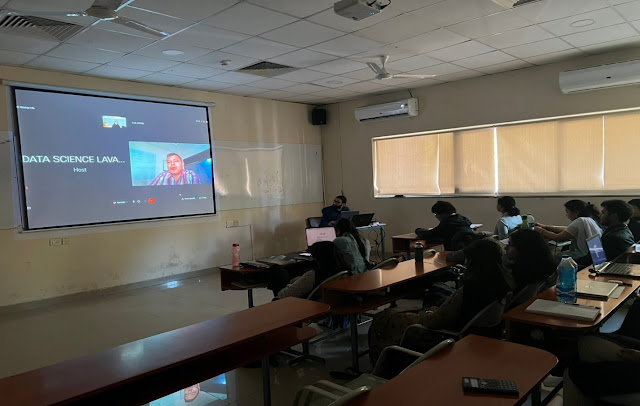WEBINAR ON DECODING UNION BUDGET 2023-24
On February 15, 2023, the Department of Data Science at CHRIST (Deemed to be University), Lavasa Pune Campus, hosted a webinar on "Decoding the Union Budget 2023-24". Prof. Nilanjan Banik, Professor, School of Management, Mahindra University addressed the students with his valuable insights on the various aspects of the Union Budget 2023-24.
Some of the main highlights of the webinar were Green Energy, Capital Expenditure and the importance of investing in primary education. Prof. Banik emphasized the need to prioritize education as a means of boosting human capital and promoting economic growth. Another key element discussed during the session was the significant investment in capital expenditure, particularly in the railway system. While this was seen as a positive development, Prof. Banik also raised concerns about the potential environmental impact of such large-scale infrastructure projects. The government announced Rs. 10,000 crores in funds to support the growth of startups and small businesses. The budget also proposed the creation of a single-window clearance system for startups, which would help reduce the time and effort required for starting a new business.
While these were some of the points made with the goal of having net zero carbon emissions in India by 2070, the budget for 2023 places an emphasis on green economic growth. The following announcements were made to support this: Green hydrogen: Awarded Rs 19,700 crore for the National Green Hydrogen Mission, which will support a transition to low carbon intensity in the economy, reduce dependency on fossil fuel imports, and establish the nation as a technology and market leader in this expanding industry. Energy transmission: It is proposed to invest a total of Rs 20,700 crore in a transmission infrastructure for 13 GW of renewable energy from Ladakh, including Rs 8,300 crore in central support.
Prof. Banik also highlighted the government's push towards making India a self-reliant economy and reducing its dependency on China for manufacturing purposes. He discussed how this could be achieved through increased investment in domestic manufacturing and a reduction in non-merit subsidies such as those for fertilizers and gas cylinders. However, he also noted that the government's actions have led to a rise in petrol and diesel prices and the reduction of free food distribution that was initiated during the COVID-19 pandemic.
Another important component of the budget for 2023 was the AgniVeer Corpus Fund, which has been changed such that contributions made by Agniveers to the Agniveer Corpus Fund will be treated as a tax deduction from their income. The contribution made by the Central Government to the Agniveer Corpus Fund will be regarded as income for the Agniveer and will be deductable. Any amount received by an Agniveer or their nominee from the Agniveer Corpus Fund will be tax-free. He highlighted an aspect of Women, SCs, STs, OBCs, and other underprivileged groups have benefited from the government's "Sabka Saath Sabka Vikas" strategy, among other categories. On top of those initiatives, the budget will continue to expand.





Comments
Post a Comment